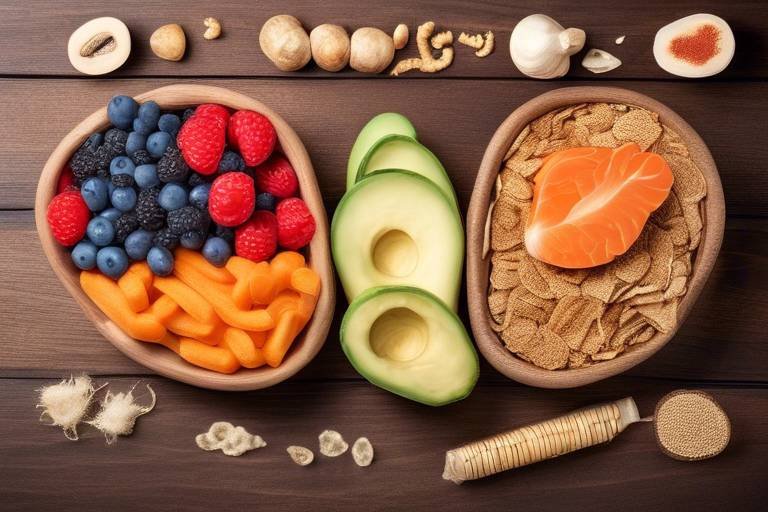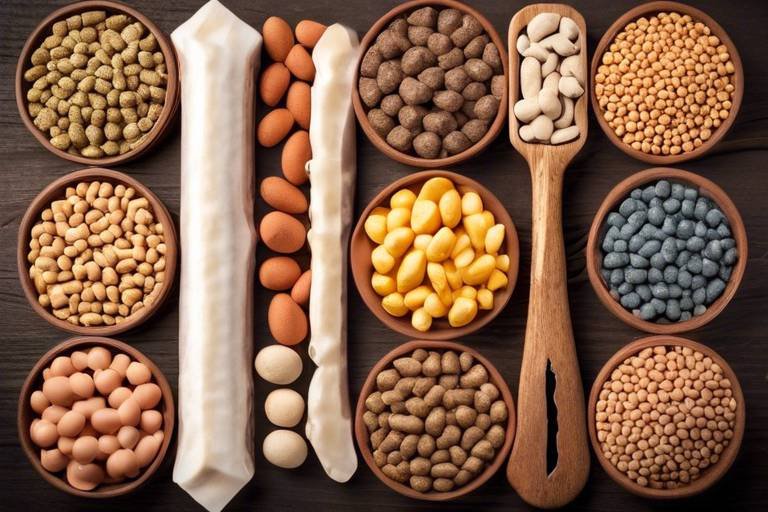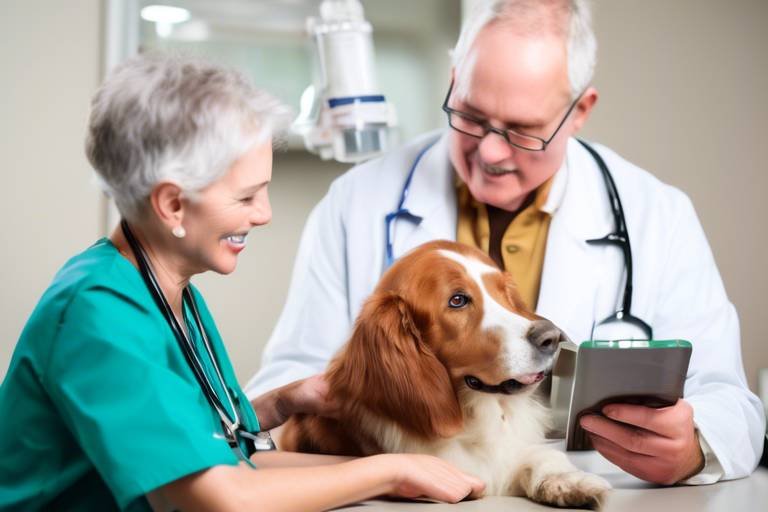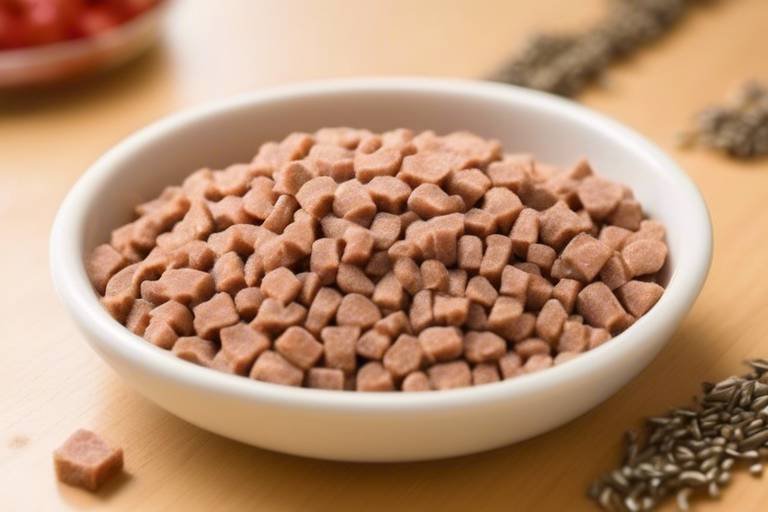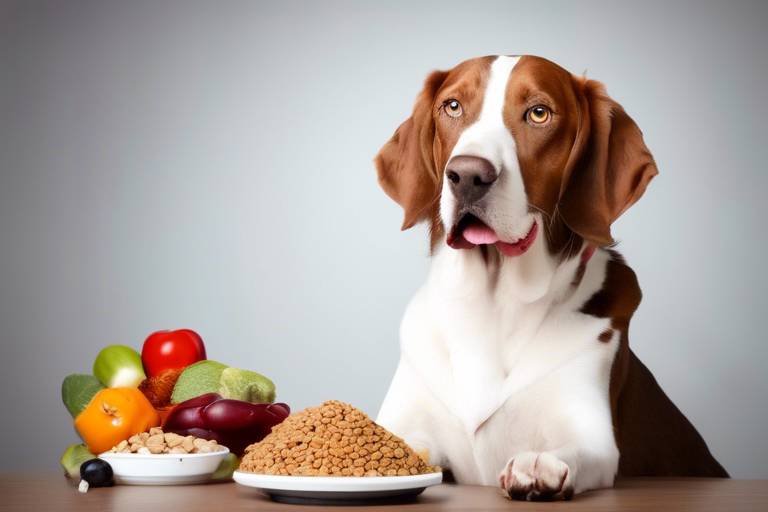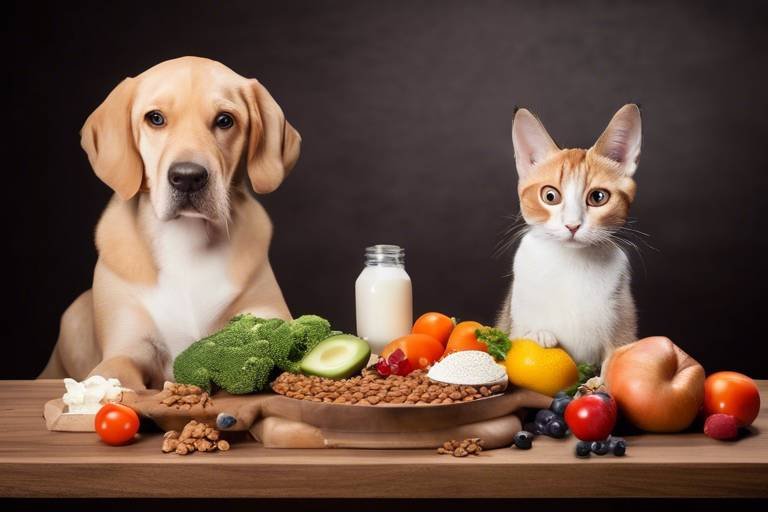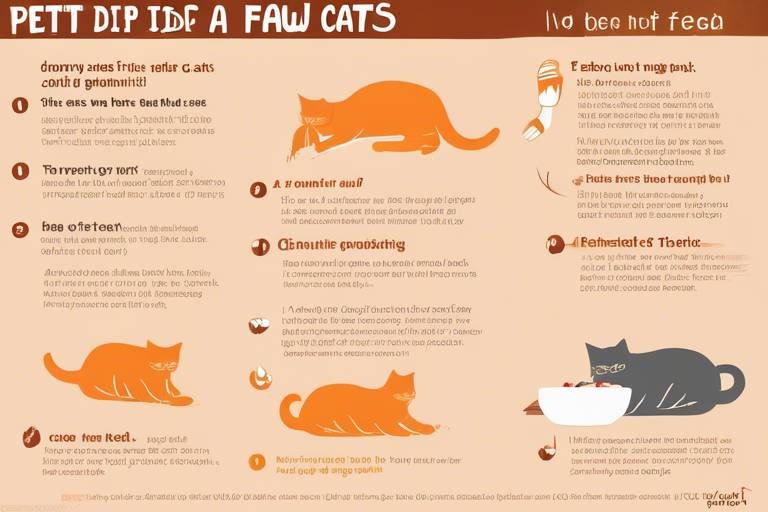The Benefits of Feeding Your Pet Home-Cooked Meals
Have you ever looked at your furry friend and thought, “What am I really feeding you?” It’s a question that many pet owners grapple with, especially when it comes to the quality of commercial pet foods. In a world where health and nutrition are paramount, feeding your pet home-cooked meals can be a game changer. Not only does it allow you to take control of what goes into their bowls, but it also opens the door to a plethora of benefits that can enhance their overall well-being. From improved nutrition to stronger bonds, let’s dive into why whipping up some homemade goodness for your pet might just be the best decision you ever make!
One of the most significant advantages of preparing home-cooked meals for your pets is the improved nutrition they receive. When you cook at home, you have complete control over the ingredients. This means you can create a balanced diet that’s rich in essential nutrients tailored specifically to your pet's needs. Imagine knowing exactly what your pet is eating—no more mystery meat or unpronounceable additives! By selecting high-quality ingredients, you can promote your pet’s overall health and vitality. Think of it as crafting a personalized meal plan that’s as unique as your pet!
Does your pet suffer from allergies? Home-cooking can be a lifesaver! When you prepare meals yourself, you can easily identify and eliminate allergens from their diet. This not only reduces the risk of allergic reactions but also significantly improves your pet's quality of life. For instance, if you notice that your dog gets itchy after eating certain commercial foods, you can switch to a home-cooked recipe that avoids those ingredients altogether. By taking charge of your pet's diet, you can help them feel more comfortable and happy.
Obesity is a growing concern among pets, and one of the best ways to tackle this issue is through portion control. By cooking at home, you can manage portion sizes and calorie intake with precision. This helps in preventing obesity and the related health issues that come with it. Think of it like being a chef who knows exactly how much of each ingredient to use to keep your pet fit and healthy. You can even create a custom meal plan that aligns with your pet's activity level and weight goals!
Cooking for your pet isn’t just about the food; it’s about the connection you build in the process. Sharing mealtime experiences fosters trust and affection between you and your furry companion. Picture this: you’re in the kitchen, chopping fresh veggies, and your dog is right there, tail wagging in anticipation. This simple act of cooking can strengthen your bond and contribute to a happier, healthier pet. It’s like creating a little ritual that you both look forward to every day!
While the initial setup for home-cooking might seem daunting or costly, it can actually be more economical in the long run. By reducing reliance on expensive commercial pet foods and buying ingredients in bulk, you can save money. Plus, you can avoid the hidden costs associated with poor nutrition, such as vet bills for health issues stemming from low-quality food. Think of it as an investment in your pet’s health that pays off in more ways than one!
When it comes to your pet’s diet, quality matters. Home-cooked meals give you complete control over the quality of the ingredients you use. You can ensure that only fresh, wholesome, and safe components are included in their meals. This is particularly important in an age where many commercial pet foods have been recalled due to contamination. With home cooking, you can rest easy knowing exactly what’s going into your pet’s bowl.
If your pet has specific health concerns, home-cooked meals can be tailored to address those issues. Whether it’s diabetes, kidney disease, or food sensitivities, you can create recipes that cater to their unique dietary needs. This level of customization is hard to find in commercial pet foods. It’s like having a personal nutritionist for your pet, ensuring they get the right nutrients to manage their condition effectively.
Let’s face it: pets can get bored with the same old kibble day in and day out. Cooking at home allows for greater variety and creativity in their diets. You can experiment with different recipes, flavors, and textures, which not only enhances palatability but also prevents mealtime boredom. Imagine your pet’s delight at discovering a new favorite dish that you whipped up just for them!
Cooking for your pets can also serve as a valuable educational experience. As you delve into animal nutrition, you’ll gain insights into what makes a balanced diet for your furry friend. This knowledge can foster a deeper understanding of their dietary needs and help you make informed choices in the future. It’s a win-win situation that benefits both you and your pet!
- Is it safe to feed my pet home-cooked meals? Yes, as long as you use safe ingredients and follow balanced recipes.
- What ingredients should I avoid when cooking for my pet? Foods like chocolate, grapes, onions, and garlic are toxic to pets.
- How do I know if my home-cooked meals are nutritionally balanced? Consult with a veterinarian or a pet nutritionist for guidance.
- Can I feed my pet the same meal every day? While it’s possible, varying their meals can prevent boredom and ensure a broader range of nutrients.

Improved Nutrition
This article explores the advantages of preparing home-cooked meals for your pets, emphasizing health, nutrition, and emotional well-being, while providing practical tips for pet owners considering this approach.
When it comes to your furry friends, nutrition is not just important; it's essential. One of the most significant advantages of feeding your pet home-cooked meals is the ability to control what goes into their diet. Think about it: when you prepare their meals yourself, you can select only the freshest and most nutritious ingredients. This means you can create a balanced diet that is tailored specifically to your pet's unique needs. For instance, if your dog requires more protein due to their active lifestyle, you can easily adjust their meals to include lean meats, legumes, or even fish.
Moreover, home-cooked meals allow you to avoid the harmful fillers and artificial additives often found in commercial pet foods. You know those long ingredient lists that sound more like a chemistry experiment than food? With home cooking, you can eliminate those concerns entirely. Instead, you can focus on wholesome ingredients like:
- Fresh vegetables
- High-quality proteins
- Healthy fats
- Whole grains
By incorporating a variety of these components, you can ensure your pet gets a well-rounded diet packed with essential vitamins and minerals. For example, carrots and sweet potatoes are not only tasty but also rich in beta-carotene, which is great for your pet's vision and immune system. Similarly, incorporating fish like salmon can provide omega-3 fatty acids that promote a shiny coat and healthy skin.
It's also important to consider the specific dietary requirements of your pet. For instance, a growing puppy or kitten will have different nutritional needs compared to an older pet. By cooking at home, you can easily adjust the recipes to meet these changing needs. This level of customization is something that pre-packaged foods simply can't offer.
In summary, the improved nutrition that comes from home-cooked meals is a game-changer for pet owners. Not only does it allow for greater control over ingredients, but it also promotes overall health and vitality. It's like being a chef for your pet, crafting meals that not only satisfy their hunger but also nourish their bodies. So, why not take that leap into home cooking? Your pet will thank you with wagging tails and happy purrs!
- Is it safe to cook for my pet? Yes, as long as you use pet-safe ingredients and follow appropriate recipes.
- What ingredients should I avoid? Foods like chocolate, onions, garlic, and grapes are toxic to pets and should be avoided.
- How do I know if my pet's diet is balanced? Consulting with a veterinarian or a pet nutritionist can help ensure you're meeting your pet's nutritional needs.
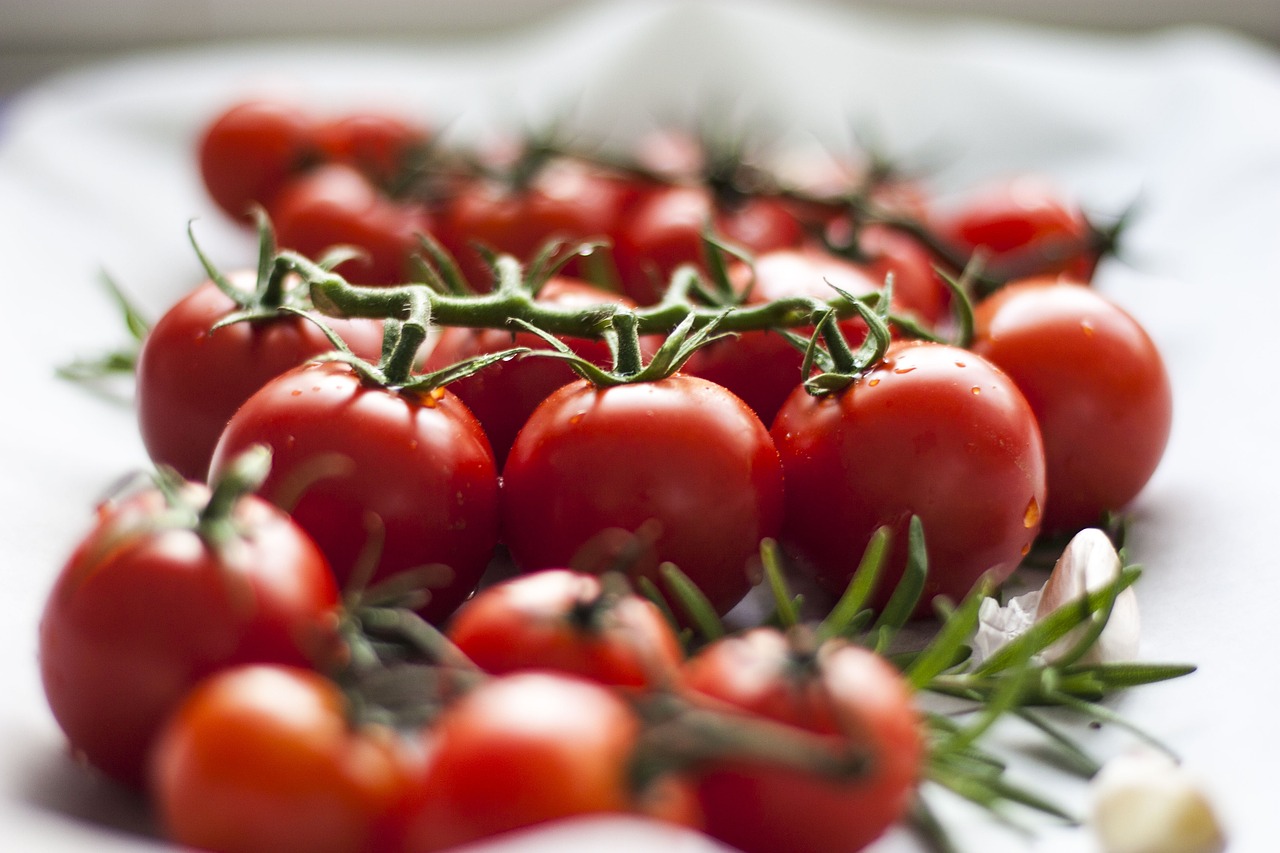
Allergy Management
This article explores the advantages of preparing home-cooked meals for your pets, emphasizing health, nutrition, and emotional well-being, while providing practical tips for pet owners considering this approach.
Home-cooked meals allow pet owners to control ingredients, ensuring a balanced diet rich in essential nutrients tailored to their pets' specific needs, promoting overall health and vitality.
When it comes to our furry friends, food allergies can be a real concern. Just like humans, pets can develop sensitivities to certain ingredients, leading to discomfort and health issues. One of the most significant advantages of cooking for your pet at home is the ability to manage allergies effectively. With home-cooked meals, you have complete control over what goes into your pet's bowl. This means you can carefully select ingredients that are free from common allergens such as grains, certain proteins, or artificial additives that could trigger a reaction.
Imagine being able to pinpoint exactly what your pet is eating. You can introduce new ingredients one at a time, observing how your pet reacts. If you notice any adverse effects, you can easily eliminate that ingredient from their diet. This tailored approach not only helps in identifying allergens but also improves your pet's overall quality of life. By avoiding allergens, you can reduce symptoms like itching, digestive issues, and lethargy, leading to a happier, healthier pet.
For instance, if your dog has a known sensitivity to chicken, you can switch to alternative protein sources like turkey or fish, ensuring that they still receive the necessary nutrients without the risk of an allergic reaction. Furthermore, by incorporating a variety of fruits and vegetables, you can enhance their diet while keeping it safe and enjoyable. Here’s a quick look at some common allergens and their alternatives:
| Common Allergens | Alternatives |
|---|---|
| Beef | Turkey, Lamb |
| Chicken | Fish, Duck |
| Grains | Sweet Potatoes, Peas |
| Dairy | Coconut Milk, Almond Milk |
Cooking at home not only allows you to avoid these common allergens but also empowers you to create a diet that is both safe and delicious for your pet. The ability to customize meals means you can cater specifically to your pet's needs, ensuring they thrive and enjoy their food without the fear of allergic reactions.
By preparing meals at home, pet owners can manage portion sizes and calorie intake, helping to prevent obesity and related health issues in their pets.
Cooking for your pet can strengthen the bond between owner and animal, as shared mealtime experiences foster trust and affection, contributing to a happier pet.
While initial setup may seem high, home-cooking can be more economical in the long run, as it reduces reliance on expensive commercial pet foods and allows for bulk ingredient purchases.
Home-cooked meals provide pet owners with control over ingredient quality, ensuring that only fresh, wholesome, and safe components are included in their pets' diets.
Home-cooked meals can be tailored to address specific health concerns, such as diabetes or kidney disease, allowing for more effective management of these conditions.
Preparing meals at home allows for greater variety and creativity in pet diets, which can enhance palatability and prevent mealtime boredom for pets.
Cooking for pets can serve as an educational experience for owners, providing insights into animal nutrition and fostering a deeper understanding of their pets' dietary needs.
Q: Can I feed my pet the same home-cooked meal every day?
A: While it's possible, it's best to provide variety in your pet's diet to ensure they receive a broad range of nutrients. Rotate ingredients and recipes to keep mealtime exciting!
Q: How do I know if my pet has a food allergy?
A: Common signs of food allergies include itching, gastrointestinal upset, and ear infections. If you suspect your pet has an allergy, consult your veterinarian for guidance.
Q: Is it expensive to cook for my pet at home?
A: While the initial investment in quality ingredients may seem high, cooking at home can often be more cost-effective than purchasing premium commercial pet foods in the long run.

Weight Control
This article explores the advantages of preparing home-cooked meals for your pets, emphasizing health, nutrition, and emotional well-being, while providing practical tips for pet owners considering this approach.
Home-cooked meals allow pet owners to control ingredients, ensuring a balanced diet rich in essential nutrients tailored to their pets' specific needs, promoting overall health and vitality.
Cooking at home enables owners to identify and eliminate allergens from their pets' diets, reducing the risk of allergic reactions and improving their pets' quality of life.
Keeping your furry friend at a healthy weight is crucial, and home-cooked meals can be a game changer in this department. When you prepare meals yourself, you have the power to manage portion sizes and control the number of calories your pet consumes. This is especially important in a world where obesity in pets is becoming alarmingly common. Did you know that over 50% of dogs and cats are overweight or obese? By cooking at home, you can tailor your pet's diet to their specific needs, which is a fantastic way to help them maintain a healthy weight.
For instance, let’s say your dog loves chicken but tends to gain weight easily. By cooking at home, you can prepare a delicious chicken dish while controlling the amount of rice or pasta you add. You can also incorporate plenty of vegetables, which are low in calories but high in nutrients. This not only keeps your pet feeling full and satisfied but also allows you to monitor their caloric intake closely. Imagine being able to see exactly what goes into your pet’s bowl instead of relying on commercial foods that may contain hidden fillers and additives.
Moreover, home-cooked meals can help you avoid the pitfalls of commercial pet foods, which often have misleading serving sizes on their packaging. These guidelines can lead to overfeeding, especially if your pet is less active. By creating a custom meal plan, you can ensure your pet is getting the right amount of food for their energy level and lifestyle. Here’s a simple table to illustrate how portion control can vary based on activity level:
| Activity Level | Recommended Daily Caloric Intake |
|---|---|
| Low (Couch Potato) | 300-400 calories |
| Moderate (Casual Walks) | 400-600 calories |
| High (Active Playtime) | 600-800 calories |
By monitoring your pet's weight and adjusting their meals accordingly, you can prevent obesity-related health issues such as diabetes, joint problems, and heart disease. It’s like being a personal trainer for your pet, ensuring they stay fit and healthy!
In addition, home-cooking offers the opportunity to introduce a variety of ingredients that can support weight management. For example, adding ingredients like green beans or pumpkin can help your pet feel fuller without adding too many calories. This is a win-win situation, as it keeps mealtime exciting and nutritious!
Ultimately, the journey to weight control through home-cooked meals is not just about the food itself; it’s about creating a healthy lifestyle for your pet. When you take the time to prepare their meals, you’re not only investing in their physical health but also in their happiness and well-being. Remember, a healthy pet is a happy pet!
Cooking for your pet can strengthen the bond between owner and animal, as shared mealtime experiences foster trust and affection, contributing to a happier pet.
While initial setup may seem high, home-cooking can be more economical in the long run, as it reduces reliance on expensive commercial pet foods and allows for bulk ingredient purchases.
Home-cooked meals provide pet owners with control over ingredient quality, ensuring that only fresh, wholesome, and safe components are included in their pets' diets.
Home-cooked meals can be tailored to address specific health concerns, such as diabetes or kidney disease, allowing for more effective management of these conditions.
Preparing meals at home allows for greater variety and creativity in pet diets, which can enhance palatability and prevent mealtime boredom for pets.
Cooking for pets can serve as an educational experience for owners, providing insights into animal nutrition and fostering a deeper understanding of their pets' dietary needs.
- Is it safe to feed my pet home-cooked meals? Yes, as long as you ensure the meals are balanced and include all necessary nutrients.
- How do I know what ingredients to use? Consult with a veterinarian or a pet nutritionist to create a balanced meal plan.
- Can home-cooked meals help with my pet's allergies? Absolutely! You can control the ingredients and eliminate potential allergens.
- Isn't it expensive to cook for my pet? While there may be initial costs, cooking at home can save money in the long run.
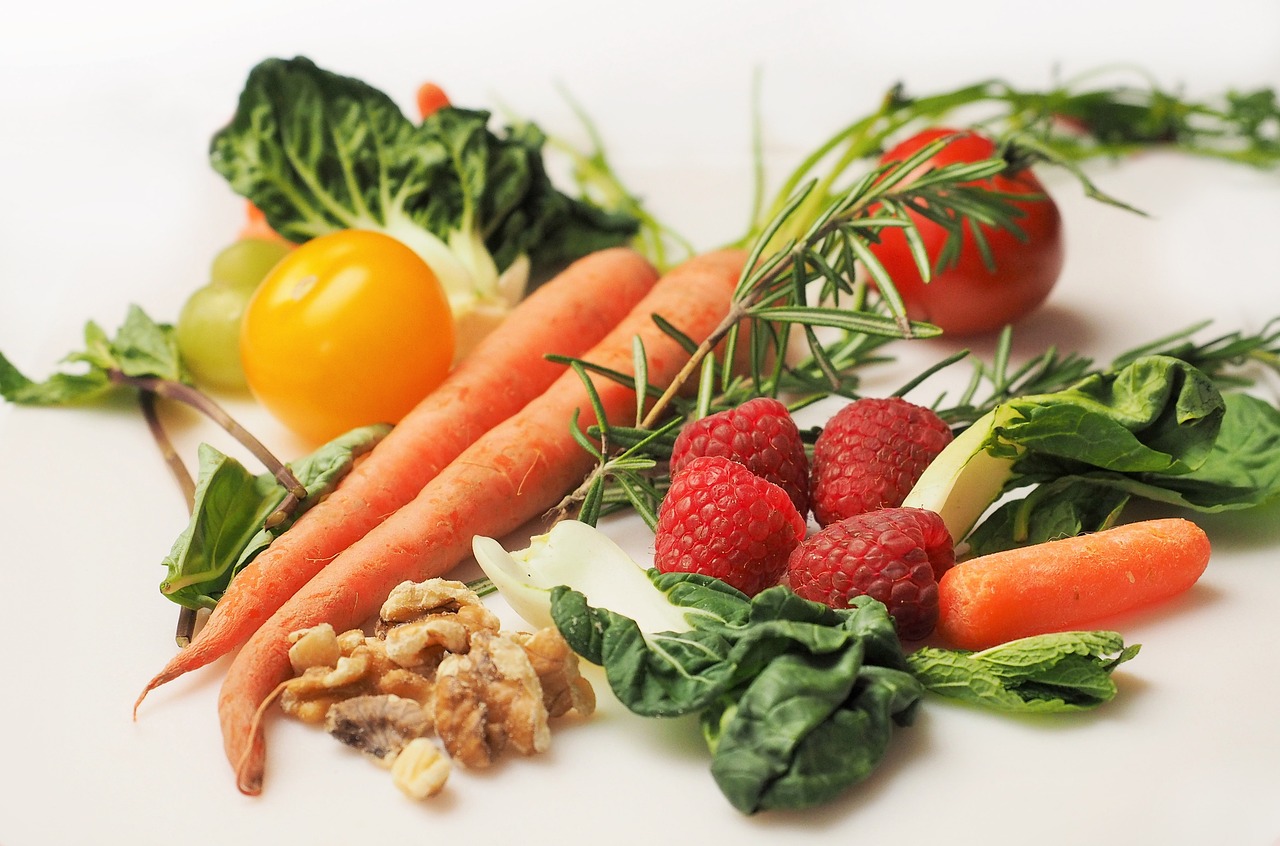
Enhanced Bonding
Cooking for your pet is not just about nutrition; it’s an incredible way to strengthen the bond between you and your furry friend. Imagine this: every time you prepare a meal, you’re not just feeding your pet, you’re creating a shared experience filled with love and care. Just like how we cherish mealtime with our family, your pet will also appreciate the effort you put into their meals. This simple act of cooking can lead to a deeper connection that goes beyond just feeding them.
When you engage in the process of home-cooking, you’re also participating in a ritual that can enhance trust and affection. Pets are incredibly intuitive; they can sense the love and effort that goes into their meals. This enhances their emotional well-being, making them feel secure and valued. Think of it as a way of saying, “I care about you” without uttering a single word. Your kitchen becomes a sanctuary of love, where ingredients transform into delicious meals that bring joy to your pet’s life.
Moreover, cooking together can be a delightful bonding activity. You can involve your pet in the process—imagine your dog sitting patiently at your feet or your cat curiously watching you chop vegetables. This not only makes for a fun experience but also reinforces the idea that mealtime is a special occasion. You can even create a unique mealtime routine that your pet looks forward to, which can include:
- Gathering ingredients together
- Involving them in the cooking space
- Creating a special mealtime ceremony
These little rituals can transform the mundane into something magical. Plus, they create lasting memories for both you and your pet. Just like how we enjoy cooking with friends and family, your pet will relish the moments spent with you in the kitchen. This shared experience will undoubtedly lead to a more affectionate relationship, making your pet feel like a cherished member of the family.
In essence, home-cooked meals are a gateway to a deeper emotional connection. The act of cooking is a labor of love that speaks volumes about your dedication to your pet’s happiness. So, the next time you're in the kitchen whipping up something special, remember that you’re not just preparing food; you’re nurturing a bond that will last a lifetime.
Q1: How can cooking for my pet enhance our bond?
A1: Cooking for your pet creates shared experiences that foster trust and affection, making your pet feel more loved and secure.
Q2: Can my pet help in the cooking process?
A2: Absolutely! Involving your pet in the cooking process, even just having them nearby, can make mealtime more special for both of you.
Q3: What are some simple recipes I can start with?
A3: Start with simple recipes like boiled chicken and rice or mashed sweet potatoes, which are easy to prepare and healthy for your pet.

Cost-Effectiveness
When it comes to feeding our beloved pets, the idea of home-cooked meals often raises eyebrows due to perceived costs. However, let’s break down the numbers and uncover the hidden savings that come with this rewarding practice. Initially, the thought of purchasing ingredients for home-cooked meals may seem daunting, especially when compared to the convenience of commercial pet food. But, consider this: by investing in bulk purchases of fresh ingredients, you can significantly reduce your overall expenses. Think of it as buying in bulk at your local grocery store; the more you buy, the less you pay per unit.
Moreover, when you prepare meals at home, you have the freedom to choose quality ingredients that are both nutritious and cost-effective. For instance, instead of relying on pricey commercial brands that often contain fillers and artificial ingredients, you can opt for whole foods that are not only healthier but also less expensive in the long run. To illustrate this point, let’s take a look at a simple comparison:
| Commercial Pet Food | Home-Cooked Meals |
|---|---|
| Average Cost per Month: $100 | Average Cost per Month: $60 |
| Quality Control: Low | Quality Control: High |
| Customization: Limited | Customization: Unlimited |
As you can see, the cost of feeding your pet with home-cooked meals can be significantly lower than relying on commercial options. Plus, you get to tailor the meals to your pet’s specific dietary needs, which can lead to better health and fewer vet visits—another area where you can save money!
Additionally, let’s not forget about the emotional benefits that come from cooking for your pet. The joy of knowing exactly what goes into your pet’s food can be priceless. You’re not just saving money; you’re investing in your pet’s well-being and happiness. And let’s face it, who wouldn’t want to do that? So, while the initial setup for home cooking might seem high, the long-term benefits and savings are undeniable. You’ll find that with a little planning and creativity, you can create delicious, nutritious meals for your furry friend without breaking the bank.
- Is home-cooked pet food really cheaper than commercial brands? Yes, when you buy ingredients in bulk and prepare meals yourself, you can save a significant amount of money over time.
- What are some cost-effective ingredients for home-cooked pet meals? Ingredients like rice, chicken, vegetables, and eggs are typically affordable and nutritious.
- Can I still provide a balanced diet without spending a lot? Absolutely! With careful planning and research, you can create balanced meals without high costs.
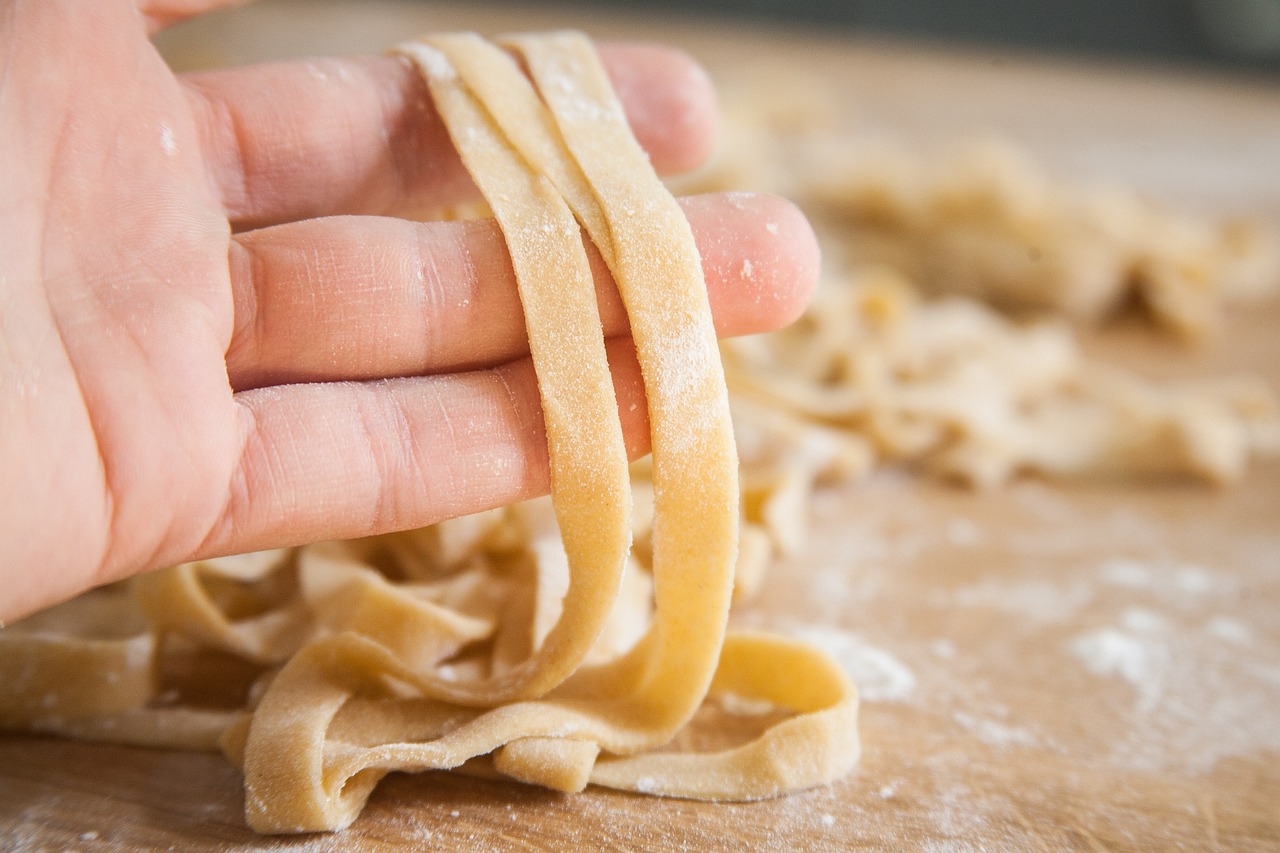
Quality Control
When it comes to feeding our furry friends, the quality of ingredients is paramount. Home-cooked meals offer pet owners unparalleled control over what goes into their pets' bowls. Imagine being able to choose only the freshest vegetables, the highest quality proteins, and the most beneficial supplements for your pet's specific dietary needs. This level of control not only ensures that your pet is receiving wholesome and nutritious meals but also allows you to avoid the questionable ingredients often found in commercial pet foods.
One of the most significant advantages of preparing meals at home is the ability to inspect and select ingredients personally. You can opt for organic produce, free-range meats, and even locally sourced items, which can be far superior to the processed options available in stores. This not only enhances the nutritional value of the meals but also ensures that your pet is consuming food free from artificial preservatives, fillers, and by-products that can be harmful in the long run.
Furthermore, home cooking allows you to tailor meals to your pet's individual needs. For instance, if your dog has a sensitive stomach, you can easily adjust their diet by eliminating certain ingredients and incorporating more gentle options. This customization is a game-changer for pets with specific health issues, as it enables you to create a diet that truly supports their well-being.
To illustrate the importance of quality control, consider the following table that compares typical commercial pet food ingredients with those you might choose for a home-cooked meal:
| Commercial Pet Food Ingredients | Home-Cooked Meal Ingredients |
|---|---|
| Meat by-products | Fresh, whole meats (chicken, beef, fish) |
| Artificial preservatives | Natural herbs and spices (turmeric, parsley) |
| Fillers (corn, soy) | Whole grains (brown rice, quinoa) and vegetables (carrots, peas) |
| Unknown sources | Locally sourced and organic ingredients |
By having this kind of control, you can actively participate in your pet’s health journey, ensuring that each meal is not just food, but a nourishing experience. This attention to quality can lead to noticeable improvements in your pet's energy levels, coat condition, and overall vitality. Plus, knowing exactly what your pet is eating can bring peace of mind to any concerned pet owner.
In conclusion, the quality of the ingredients you choose for your pet’s meals can have a significant impact on their health and happiness. Home-cooked meals empower you to make informed decisions about what goes into your pet's diet, ultimately leading to a happier and healthier life for your four-legged companion.
- Is it safe to cook for my pet? Yes, cooking for your pet can be safe and beneficial if you follow proper guidelines and consult with a veterinarian.
- What ingredients should I avoid? Avoid ingredients like onions, garlic, chocolate, grapes, and raisins, as they can be toxic to pets.
- How do I ensure my pet's diet is balanced? Consult with a veterinarian or a pet nutritionist to create a balanced meal plan tailored to your pet's specific needs.
- Can I use leftovers from my meals? Some leftovers can be safe for pets, but always check which foods are appropriate and avoid those that are harmful.

Customization for Health Issues
When it comes to our beloved pets, one size definitely does not fit all. Each furry friend is unique, with their own set of health needs and dietary requirements. This is where home-cooked meals shine, offering a level of customization that commercial pet foods simply can't match. Imagine being able to whip up a meal that not only tantalizes your pet's taste buds but also caters specifically to their health concerns. Sounds pretty amazing, right?
For instance, if your dog has been diagnosed with diabetes, you can create meals that are low in carbohydrates and high in fiber, helping to maintain stable blood sugar levels. On the other hand, if your cat is struggling with kidney disease, you can prepare meals that are lower in protein and phosphorus, which can help ease the strain on their kidneys. This tailored approach ensures that you are not just feeding your pet, but actively contributing to their well-being.
Moreover, customizing your pet’s meals allows you to incorporate ingredients that are beneficial for their specific health issues. Here are a few examples of ingredients that can be included:
- Sweet Potatoes: Great for digestive health and rich in vitamins.
- Pumpkin: Excellent for fiber and can help with digestive issues.
- Fish Oil: Beneficial for skin health and can help with inflammation.
- Carrots: A low-calorie treat that is high in beta-carotene.
But it’s not just about the ingredients; it’s also about the preparation methods. Cooking methods such as steaming or boiling can retain more nutrients compared to frying or overcooking. This means your pet is getting the most out of every meal you prepare. Plus, you can adjust the texture of the food based on your pet’s needs. For example, older pets may benefit from softer, easier-to-chew meals, while younger pets might enjoy a crunchier texture.
Another significant advantage of home-cooked meals is the ability to monitor your pet’s response to different ingredients. If you notice that certain foods lead to adverse reactions, you can easily eliminate them from your pet’s diet. This level of control can significantly improve your pet's quality of life, as you can adapt their meals based on their health and preferences.
Ultimately, the customization of home-cooked meals not only promotes better health outcomes but also strengthens the bond between you and your pet. By taking the time to prepare meals that cater to their specific health concerns, you’re showing them just how much you care. It’s a win-win situation—your pet enjoys delicious meals tailored to their needs, and you gain peace of mind knowing you are doing everything possible to support their health.
1. Can I use regular human food to cook for my pet?
Yes, but it’s essential to ensure that the ingredients are safe for your pet. Some foods, like onions and chocolate, can be harmful.
2. How do I know what my pet needs in their diet?
Consult with your veterinarian to understand your pet's specific health requirements and dietary restrictions.
3. Is it time-consuming to prepare home-cooked meals for pets?
Initially, it may take some time to plan and prepare meals, but once you get the hang of it, you can streamline the process.
4. Can I cook in bulk for my pet?
Absolutely! Cooking in bulk can save you time and allow you to store meals for future use. Just make sure to follow proper storage guidelines.
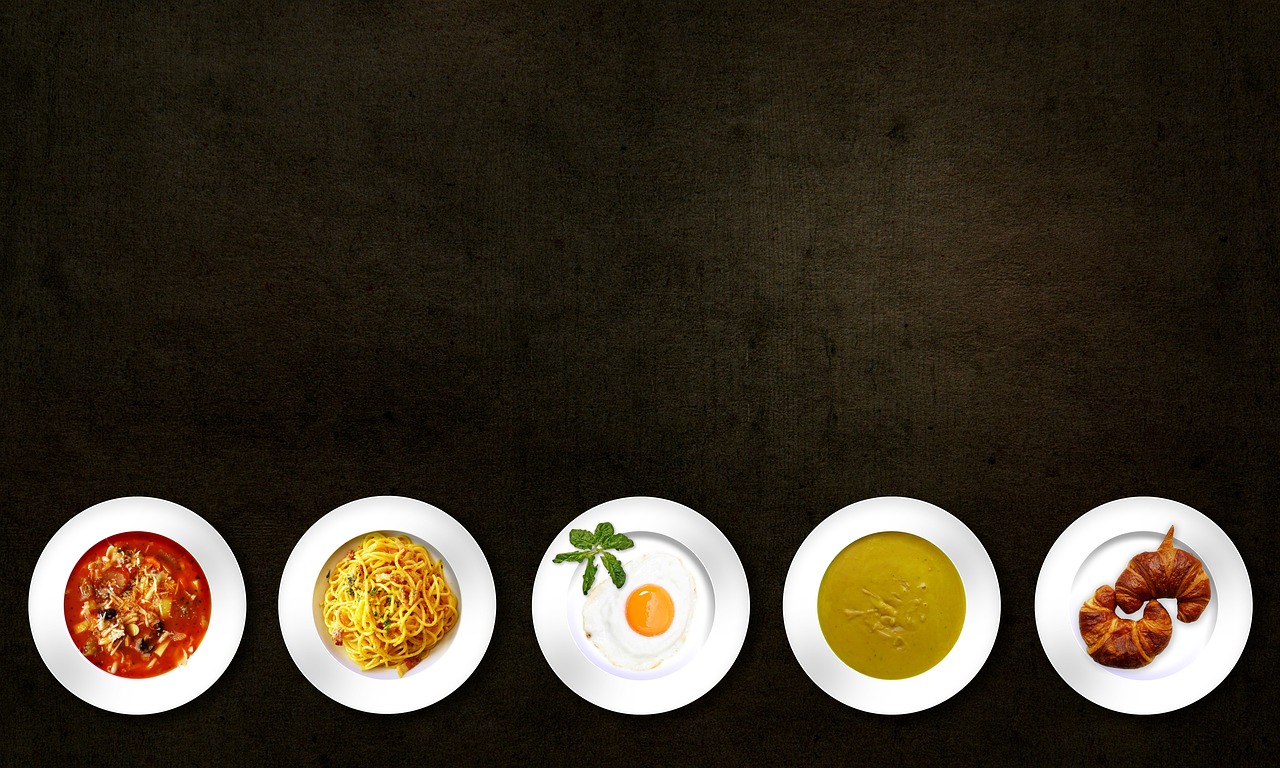
Variety and Taste
This article explores the advantages of preparing home-cooked meals for your pets, emphasizing health, nutrition, and emotional well-being, while providing practical tips for pet owners considering this approach.
Home-cooked meals allow pet owners to control ingredients, ensuring a balanced diet rich in essential nutrients tailored to their pets' specific needs, promoting overall health and vitality.
Cooking at home enables owners to identify and eliminate allergens from their pets' diets, reducing the risk of allergic reactions and improving their pets' quality of life.
By preparing meals at home, pet owners can manage portion sizes and calorie intake, helping to prevent obesity and related health issues in their pets.
Cooking for your pet can strengthen the bond between owner and animal, as shared mealtime experiences foster trust and affection, contributing to a happier pet.
While initial setup may seem high, home-cooking can be more economical in the long run, as it reduces reliance on expensive commercial pet foods and allows for bulk ingredient purchases.
Home-cooked meals provide pet owners with control over ingredient quality, ensuring that only fresh, wholesome, and safe components are included in their pets' diets.
Home-cooked meals can be tailored to address specific health concerns, such as diabetes or kidney disease, allowing for more effective management of these conditions.
When it comes to feeding our furry friends, variety is the spice of life! Just like us, pets can get bored with the same old kibble day in and day out. By preparing home-cooked meals, you can introduce a delightful range of flavors and textures that will keep your pet excited about mealtime. Imagine serving up a mouthwatering chicken stew one day, followed by a savory beef and vegetable medley the next. Not only does this variety make meals more enjoyable, but it also encourages your pet to eat a balanced diet, as different ingredients provide different nutrients.
Moreover, home-cooking allows you to experiment with ingredients that your pet loves. You can incorporate fruits and vegetables that are safe for them, such as carrots, peas, or blueberries, adding not just taste but also essential vitamins and minerals. This creative freedom can transform mealtime into a gourmet experience for your pet. You can even create themed meals, like a “Taco Tuesday” with ground turkey and sweet potatoes, or a “Fish Friday” with salmon and spinach. The possibilities are endless!
To give you an idea of how diverse home-cooked meals can be, here’s a simple table showcasing different proteins and their complementary ingredients:
| Protein Source | Complementary Ingredients | Benefits |
|---|---|---|
| Chicken | Carrots, peas, brown rice | High in protein, promotes muscle growth |
| Beef | Sweet potatoes, green beans | Rich in iron, supports energy levels |
| Fish | Spinach, quinoa | Omega-3 fatty acids, good for skin and coat |
| Turkey | Zucchini, oats | Low-fat protein, helps with weight management |
By rotating through different proteins and ingredients, you can ensure that your pet not only enjoys their meals but also receives a well-rounded diet. So, why settle for monotonous commercial pet food when you can whip up exciting and nutritious meals in your kitchen?
- Can I feed my pet human food?
Yes, but make sure to research which foods are safe and beneficial for your pet. - How do I ensure my home-cooked meals are balanced?
Consult with a veterinarian or a pet nutritionist to create balanced recipes. - Is it cheaper to cook for my pet?
It can be, especially if you buy ingredients in bulk and avoid expensive commercial pet foods. - What are some easy recipes to start with?
Simple recipes include boiled chicken with rice or ground turkey with vegetables.
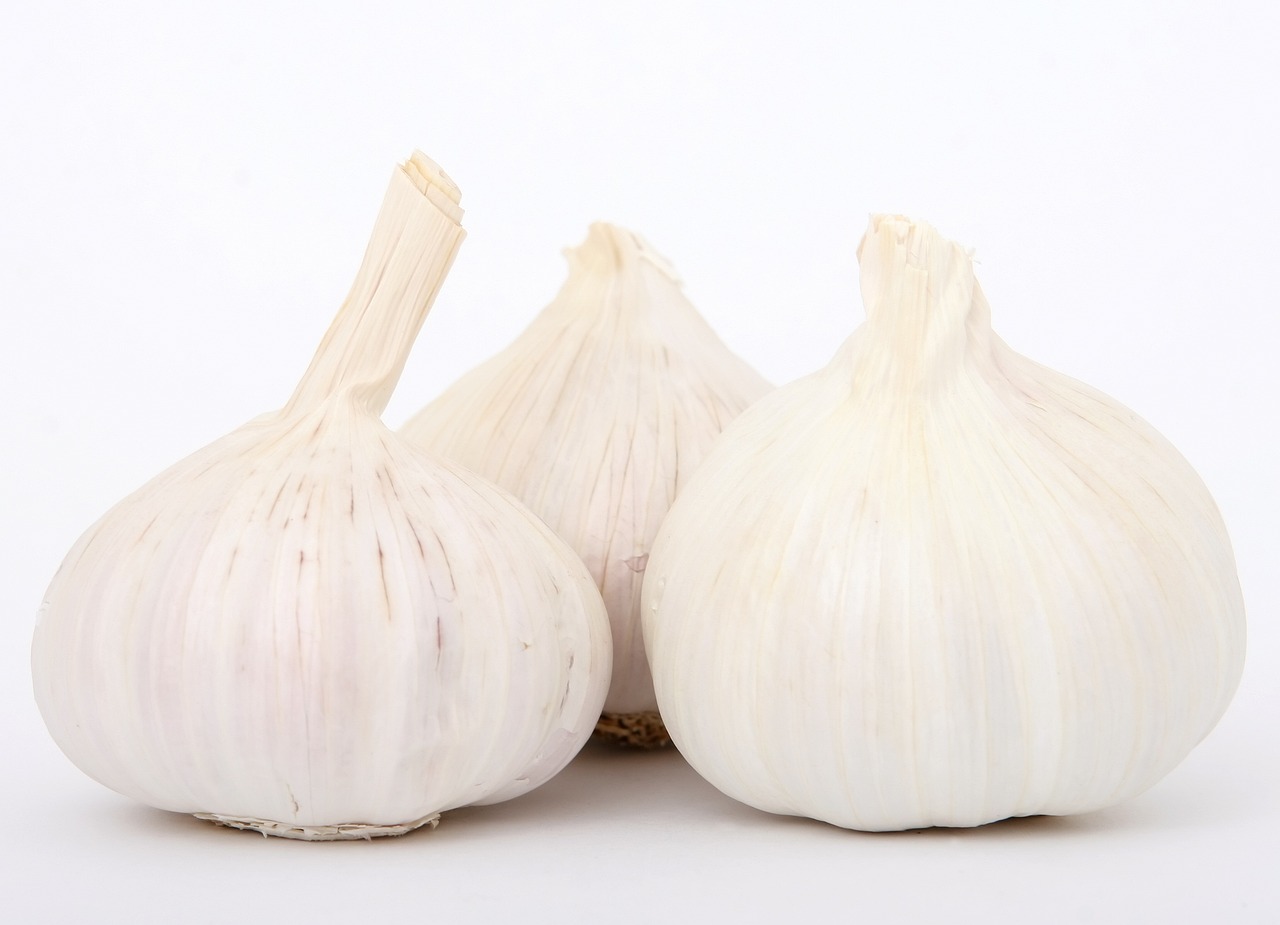
Educational Opportunity
This article explores the advantages of preparing home-cooked meals for your pets, emphasizing health, nutrition, and emotional well-being, while providing practical tips for pet owners considering this approach.
Home-cooked meals allow pet owners to control ingredients, ensuring a balanced diet rich in essential nutrients tailored to their pets' specific needs, promoting overall health and vitality.
Cooking at home enables owners to identify and eliminate allergens from their pets' diets, reducing the risk of allergic reactions and improving their pets' quality of life.
By preparing meals at home, pet owners can manage portion sizes and calorie intake, helping to prevent obesity and related health issues in their pets.
Cooking for your pet can strengthen the bond between owner and animal, as shared mealtime experiences foster trust and affection, contributing to a happier pet.
While initial setup may seem high, home-cooking can be more economical in the long run, as it reduces reliance on expensive commercial pet foods and allows for bulk ingredient purchases.
Home-cooked meals provide pet owners with control over ingredient quality, ensuring that only fresh, wholesome, and safe components are included in their pets' diets.
Home-cooked meals can be tailored to address specific health concerns, such as diabetes or kidney disease, allowing for more effective management of these conditions.
Preparing meals at home allows for greater variety and creativity in pet diets, which can enhance palatability and prevent mealtime boredom for pets.
Cooking for your pets is not just about mixing ingredients; it’s a fantastic educational opportunity that can transform how you view your furry friend's nutrition. When you take the time to prepare meals at home, you're diving deep into the world of animal nutrition. This experience can be enlightening, as you discover what your pet truly needs to thrive. You’ll learn to read labels, understand the nutritional value of different foods, and recognize which ingredients are beneficial or harmful.
Moreover, this journey can foster a deeper connection with your pet. Imagine the joy of experimenting with different recipes and observing how your furry companion responds to various flavors and textures. It’s like being a chef in a gourmet restaurant, where your pet is the critic. Through this process, you'll gain insights into their preferences and nutritional needs, which can be invaluable for their health.
Additionally, cooking for your pet can open up discussions with veterinarians and pet nutritionists. You’ll be equipped with questions and knowledge that can lead to more informed conversations about your pet's dietary needs. This proactive approach not only benefits your pet but also enhances your role as a responsible pet owner. You might even find yourself sharing your experiences with other pet owners, creating a community of like-minded individuals who prioritize their pets' health and happiness.
In essence, the act of cooking for your pet is a gateway to understanding their dietary requirements better and ensuring they receive the best nutrition possible. So, roll up your sleeves, grab those ingredients, and embark on this educational adventure!
- Is home-cooked food better than commercial pet food?
Home-cooked meals can provide better control over ingredients and nutrition tailored to your pet's specific needs. - What ingredients should I avoid when cooking for my pet?
Common harmful ingredients include onions, garlic, chocolate, grapes, and certain nuts. Always research before introducing new foods. - Can I cook for my pet if they have specific health issues?
Yes! Home-cooked meals can be customized to address specific health concerns, but it's best to consult with a veterinarian. - How do I ensure my pet's diet is balanced?
Research pet nutrition or consult with a veterinarian or pet nutritionist to create a balanced meal plan.
Frequently Asked Questions
- What are the main benefits of feeding my pet home-cooked meals?
Feeding your pet home-cooked meals offers numerous benefits, including improved nutrition, better allergy management, and weight control. It allows you to customize meals to meet your pet's specific health needs, enhancing their overall well-being and vitality.
- Can home-cooked meals help with my pet's allergies?
Absolutely! By preparing meals at home, you can identify and eliminate specific allergens from your pet's diet. This control significantly reduces the risk of allergic reactions, leading to a happier and healthier pet.
- Is it cost-effective to cook for my pet?
While the initial setup may seem costly, home-cooking can actually save you money in the long run. You can buy ingredients in bulk and reduce reliance on expensive commercial pet foods, making it a more economical choice over time.
- How does cooking for my pet strengthen our bond?
Cooking for your pet creates shared experiences that foster trust and affection. Just like how sharing a meal with friends can deepen relationships, preparing food for your pet can enhance your emotional connection and lead to a happier pet.
- Can I customize my pet's meals for specific health issues?
Yes! Home-cooked meals can be tailored to address various health concerns like diabetes or kidney disease. This customization allows for more effective management of these conditions, ensuring your pet receives the best care possible.
- What if my pet gets bored of the same meals?
Cooking at home offers you the freedom to introduce variety and creativity into your pet's diet. You can experiment with different ingredients and recipes to keep mealtime exciting and prevent boredom.
- Do I need special skills to cook for my pet?
No special culinary skills are required! As long as you follow basic recipes and guidelines, you can prepare nutritious meals for your pet. Plus, it can be a fun and educational experience that deepens your understanding of animal nutrition.
- How do I ensure my pet's meals are nutritionally balanced?
To ensure balanced nutrition, consider consulting with a veterinarian or a pet nutritionist. They can help you create meal plans that include all essential nutrients tailored to your pet's specific needs.



